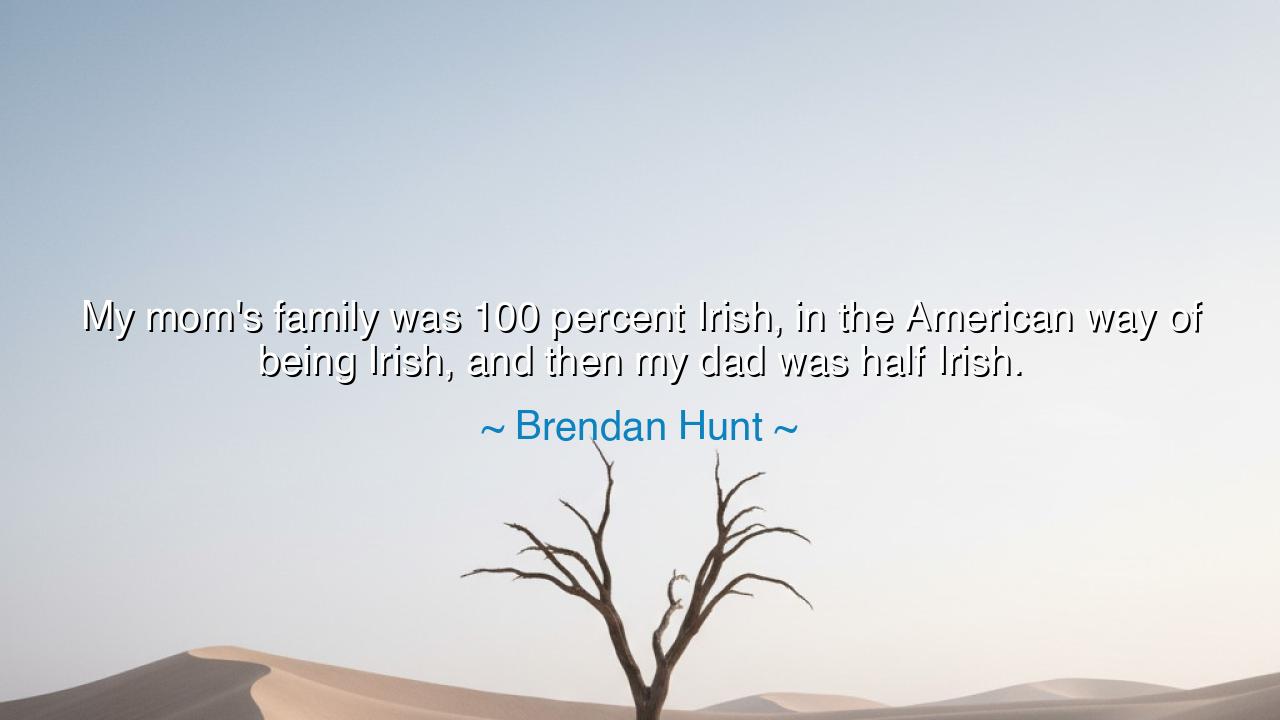
My mom's family was 100 percent Irish, in the American way of
My mom's family was 100 percent Irish, in the American way of being Irish, and then my dad was half Irish.






“My mom’s family was 100 percent Irish, in the American way of being Irish, and then my dad was half Irish,” said Brendan Hunt, in a statement that may, at first glance, seem simple — a mere reflection on lineage and blood. Yet within it lies the profound truth of how identity is carried, reshaped, and reborn through generations. For the ancient soul understands that heritage is not only what flows through the veins but also what is remembered, reimagined, and lived. In Hunt’s words, we hear the echo of a people who crossed seas, endured hunger, and found new life in strange lands, bringing with them not only their names and customs but their music, humor, and indomitable spirit.
To say one is “Irish in the American way” is to speak of transformation — the alchemy of memory that turns loss into tradition, and exile into identity. The Irish who came to America in the 19th century fled the black shadow of famine, leaving behind the emerald hills of home for the soot-stained streets of cities like New York, Boston, and Chicago. They arrived poor, despised, and unwelcomed — yet they carried within them the fierce pride of a people who would not be broken. Over time, they wove their heritage into the fabric of a new world, creating a new kind of Irishness: one that honored the past but lived boldly in the present.
Hunt’s reflection reminds us that heritage evolves, but never dies. The Irish in America kept their music alive in taverns and kitchens, their stories alive in laughter and sorrow. Even generations later, when accents faded and Gaelic words grew distant, the spirit of Ireland — its warmth, its wit, its resilience — continued to flow like an underground river. To be “Irish in the American way” is not merely to trace one’s ancestry but to inherit the emotion of a people: their courage, their humor in hardship, their songs of both grief and joy.
Throughout history, this blending of old world and new has created something wondrous. Think of John F. Kennedy, whose Irish grandparents came to America with little more than faith, and who rose to become the President of the United States — the first of Irish Catholic blood to do so. In his voice, one could still hear the rhythm of Ireland’s orators, though shaped by the cadence of America. He was not fully of one world nor the other, but of both — a living symbol of how heritage, when honored, can become a bridge rather than a boundary.
So too in Brendan Hunt’s lineage, the blood of Ireland meets the heart of America, and from that union springs identity renewed. The Irish-American soul is a reminder to all people that our origins need not bind us, but guide us. We are not imprisoned by the soil from which we came; rather, we are nourished by it. The ancestors live not in the tombs of memory but in the gestures, songs, and laughter we carry forward. The way of being “Irish in America” is, at its heart, the way of all exiles — to take root again, to carry the flame of old traditions into the winds of new worlds.
The lesson here, my child, is not limited to one nation or people. It is this: honor where you come from, but let it grow through you. Heritage is not a museum to be guarded but a living tree whose branches reach toward the future. Whether your blood is Irish, African, Asian, or any other, the true test is not what is in your ancestry, but what you make of it. Take the humor of your forebears, their strength, their wisdom, and let them shape how you live and love today.
So when Brendan Hunt speaks of being “Irish in the American way,” he speaks for all who stand between worlds — children of migration, heirs of memory, keepers of hope. Let us remember that identity is both inheritance and creation. We are the songs our ancestors sang, but also the new verses we add. To know oneself, then, is to hold both the past and the present in the same heart — to walk forward while hearing the distant music of those who came before. And as long as we carry that music, we are never truly divided, nor ever far from home.






AAdministratorAdministrator
Welcome, honored guests. Please leave a comment, we will respond soon